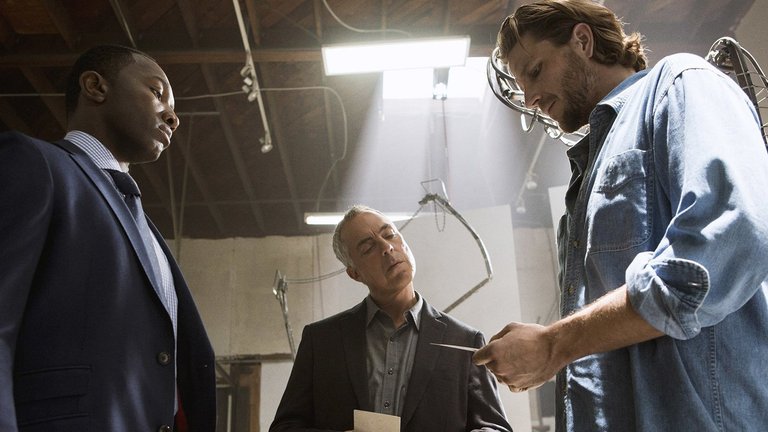
In 2017 news of two elite American special forces soldiers arrested in Mali, suspected of killing a comrade over a pile of counterfeit dollars, might have led fans of the American TV series Bosch to conclude that life imitated art. This impression would be further reinforced by a plotline from the third season, originally aired in the same year, which also bears an unsettling resemblance to the escalating scandals shaking Hollywood at that very time. For the titular protagonist, Los Angeles detective Harry Bosch (Titus Welliver), such scandals are part of the daily grind in the homicide department, yet they still complicate his life—primarily because Andrew Holland (John Ales), a powerful Hollywood producer accused of murdering a starlet, wields influence, wealth, and resources far beyond the reach of ordinary mortals. Even after Holland arrogantly confesses to the murder, the chances of him actually ending up in prison are slim, and they diminish further when Bosch himself becomes a suspect in the killing of an elderly man accused of serial murders of prostitutes.
While Bosch strives to clear his name and ensure the villain faces justice, he simultaneously investigates the case of a homeless former special forces soldier he believes was assassinated by ex-comrades with whom he once carried out covert missions in Iraq and Afghanistan. Bosch’s efforts could be aided by Sharkey (Bridge Zadina), a street kid who may hold key evidence and whose troubled life uncomfortably mirrors Bosch’s own traumatic childhood and youth.
The connection between Bosch and real-world events becomes especially striking when comparing this season to the previous two. Although the number of Michael Connelly novels adapted for the script has been reduced from three to two, the season’s narrative is far more intricate, weaving together multiple subplots loosely but realistically connected—a significant improvement over the tighter, less believable resolutions of earlier seasons. This realism extends to callbacks to the previous season: one of the main antagonists walks free at the start of this season thanks to a skilled lawyer, but Bosch reacts to this injustice with nothing more than a shrug, and the writers show little interest in crafting a revenge-driven or vigilante-style storyline.
The third season has enough material to fill a standard 10 episodes without resorting to “shocking” cliffhangers or attempting to neatly resolve everything within a single episode, as typical police procedurals often do. In many ways, this season, more than the previous two, feels shaped by one of the minds behind The Wire, with criminal investigations taking a backseat to character development and the political machinations surrounding police work in Los Angeles. Similarly to earlier seasons, viewers know the perpetrators’ identities from the outset, making the focus on how Bosch exposes them—and the personal cost he and his loved ones must pay—far more compelling.
Bosch remains a fascinating character, even if he embodies a bundle of clichés (a fact explicitly acknowledged in one of the show’s dialogue lines), and despite the resolution of his mother’s death in the previous season supposedly exorcising his personal demons. Series creator Eric Overmyer, however, avoids making the show solely about Bosch, instead dedicating substantial screen time to other characters, particularly his boss (played by the intriguing Amy Aquino) and partner J. Edgar (veteran Wire actor Jamie Hector), whose previously unquestioning loyalty to Bosch will be tested by professional integrity. Paul Calderon also delivers a strong performance as the detective investigating Bosch as a suspect while, ironically, serving as a sort of alter ego due to his similar methods and worldview.
While this season is highly effective, it is far from flawless, with notable shortcomings primarily stemming from a less-than-clever approach to filling 10 episodes. Some subplots feel superfluous, particularly the subplot involving police chief Irving’s (the ever-reliable Lance Reddick) attempts to reconcile his career with new romantic prospects. Even clumsier is the contrived thread of a brazen bike-riding killer used to spice up the season. Worst of all, though, is the “soap opera” ending that implies the mystery of Bosch’s mother’s murder remains unsolved, leaving him to finish the mission in a fourth season.
RATING: 7/10 (+++)
(Note: The text in the original Croatian version is available here.)
Blog in Croatian https://draxblog.com
Blog in English https://draxreview.wordpress.com/
InLeo blog https://inleo.io/@drax.leo
LeoDex: https://leodex.io/?ref=drax
Hiveonboard: https://hiveonboard.com?ref=drax
InLeo: https://inleo.io/signup?referral=drax.leo
Rising Star game: https://www.risingstargame.com?referrer=drax
1Inch: https://1inch.exchange/#/r/0x83823d8CCB74F828148258BB4457642124b1328e
BTC donations: 1EWxiMiP6iiG9rger3NuUSd6HByaxQWafG
ETH donations: 0xB305F144323b99e6f8b1d66f5D7DE78B498C32A7
BCH donations: qpvxw0jax79lhmvlgcldkzpqanf03r9cjv8y6gtmk9